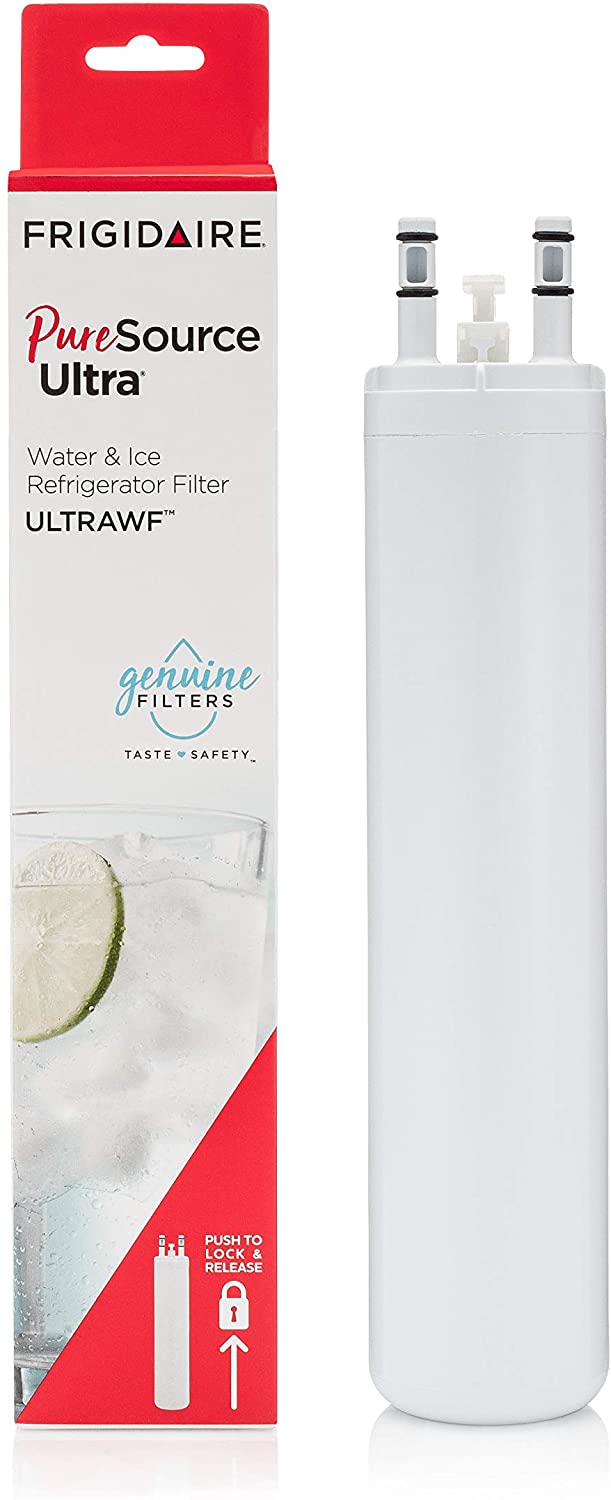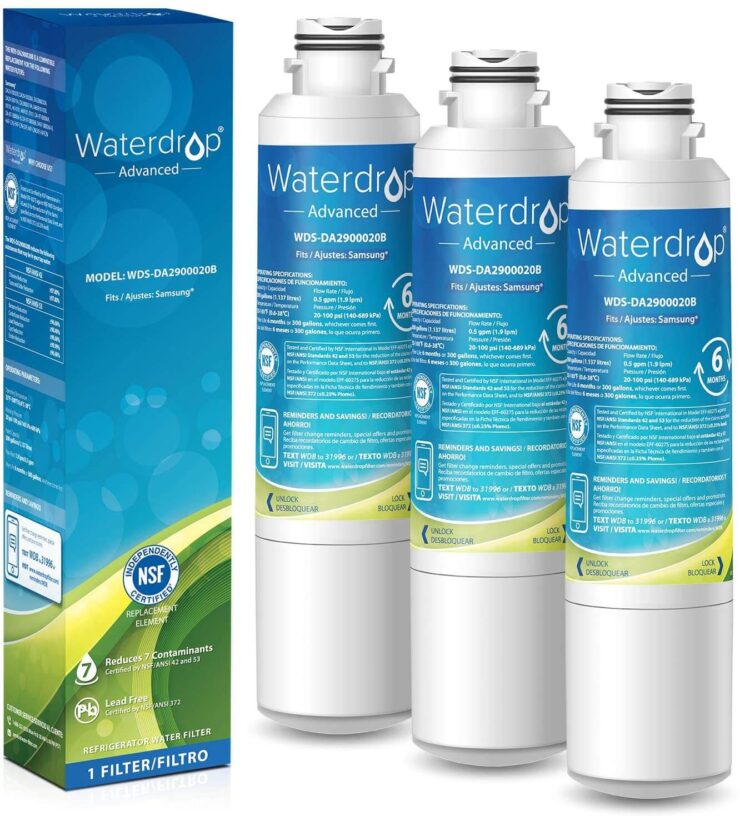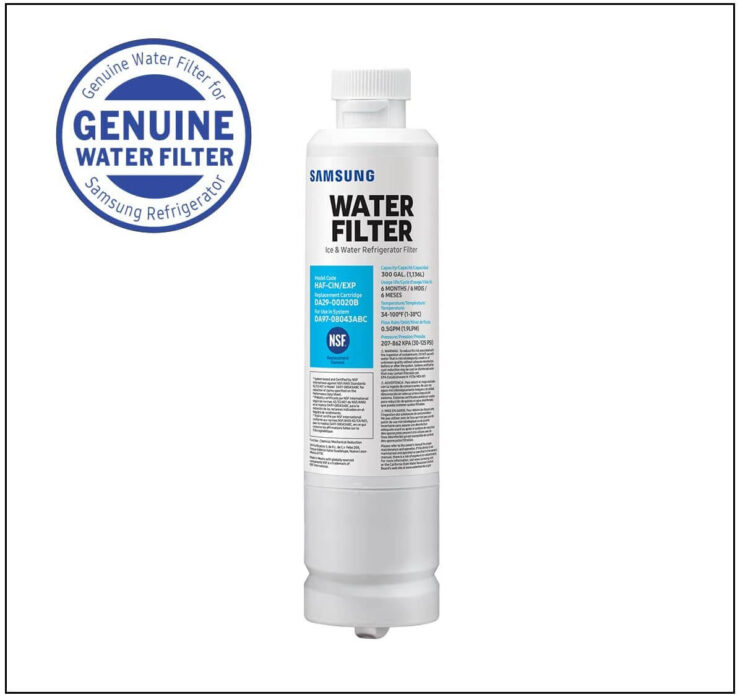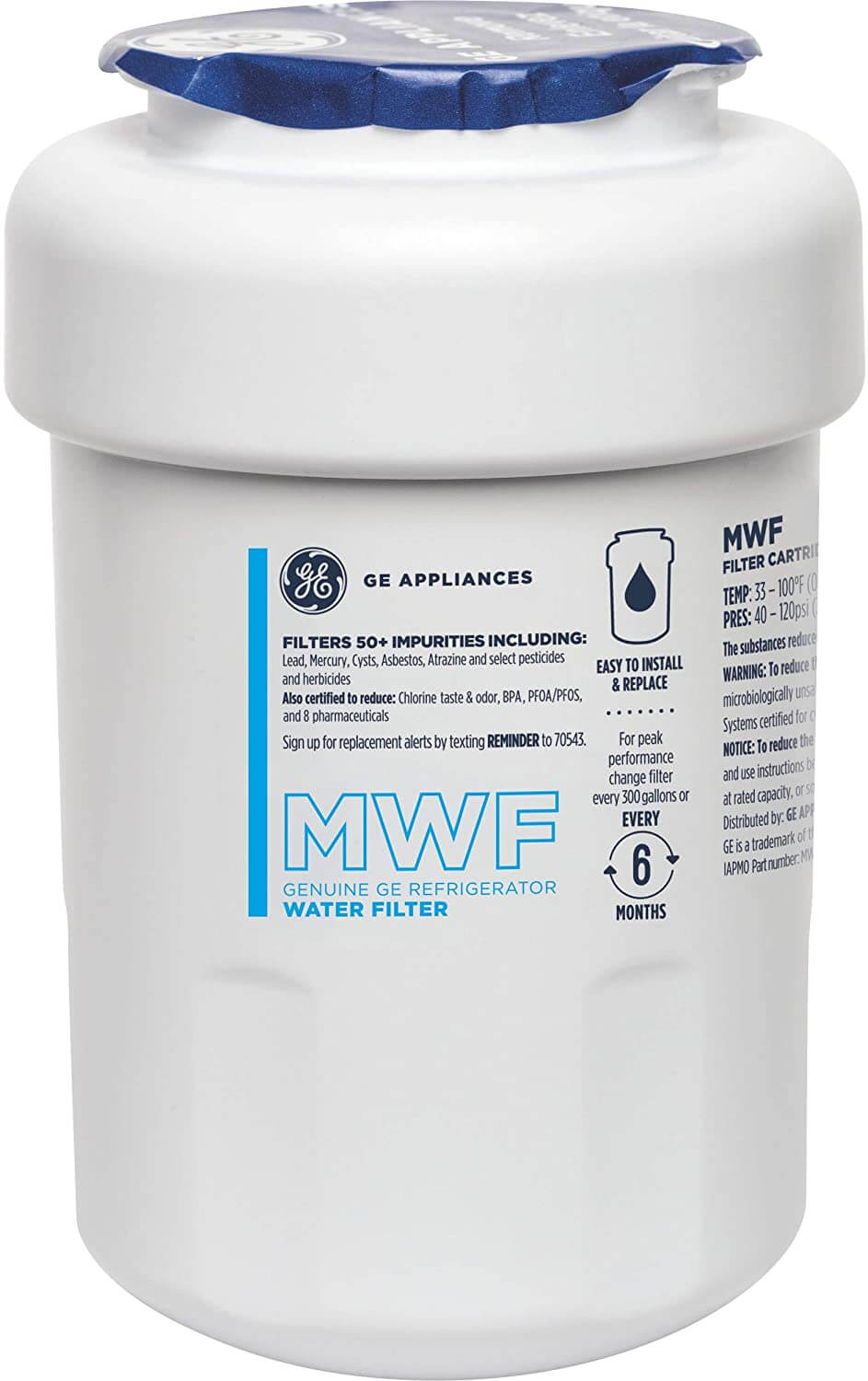Water filters come in a variety of forms, but refrigerator filters certainly have the edge in terms of convenience. Unlike jug-based water filters, fridge filters filter water straight from your water supply, providing clean, fresh water without the hassle of needing to be refilled every few hours.
Fridge water filters are considered an essential part of everyday life to many of us because of their ability to remove potentially harmful contaminants from our drinking water. But how do you know which is the best refrigerator water filter for you? Let’s take a look at our top picks – there are 10 of them in total and if you cannot find what you are looking for, you can visit thehealthycuisine.com for more refrigerator filter reviews.
Best Pick

The Frigidaire ULTRAWF PureSource Ultra Water Filter is carbon-based, easy to install and replace and provides premium filtration, making it our best pick if you’re looking for an all-round great filter.
Budget Pick

Coming in a 3-pack for the same price as just 1 of the more expensive filters on our list, the Waterdrop NSF provides great quality filtration for the price.
Quick Comparison: Top 10 Picks for Refrigerator Water Filters
1. Frigidaire ULTRAWF PureSource Ultra Water Filter

Highlighted Features
- Effective carbon-based filter
- Easy to install
- Removes many types of impurities
The Fridgidaire ULTRAWF PureSource Ultra Water Filter is a great all-rounder, with all the features you could ask of a water filter. First off, it is carbon-based, which is always a sign of a good quality filter. Fridgidaire’s filters are tested and certified by NSF International to remove the odor and taste of chlorine, lead, cysts, turbidity and more. You can see the full details on everything it can remove on Fridgidaire’s performance data sheet.
Along with its effectiveness and removing impurities, this filter is easy to install. Simply push to release the old filter, then push in the new one and turn it to the right until it clicks into place. Some buyers have reported issues removing this filter from their fridge, however, so this may be something to keep in mind. It is recommended to replace this filter every 6 months for best results.
Fridgidaire ULTRAWF is certified by the Water Quality Association for sustainability and is partnered with U.S. Customs to tackle the issue of fake water filters in the USA, giving them that all important credibility we want to see in our water filters.
2. Waterdrop NSF 53&42 Certified DA29-00020B Refrigerator Water Filter

Highlighted Features
- Comes in a 3-pack
- NSF certified to reduce lead, chlorine taste, cysts and more
- Simple twist and lock design
Tired of hearing about fancy high-priced filters? Allow us to introduce the Waterdrop filter, which comes in a 3-pack for the same price as a 1-pack of the more expensive filters on our list.
The Waterdrop filter doesn’t reduce quite as many contaminants as its more expensive counterparts, but it provides a great level of filtration for the price. Among other contaminants, it is certified to reduce 99.6% of Lead, 99.99% of Cyst, 96.6% of Benzene, 98.4% of Carbofuran, 96.6% of Endrin and 97% of chlorine taste and odor, for safer, great-tasting water.
This filter also features a simple twist and lock design for easy installation and replacement. It is recommended to replace every 6 months for best results.
3. Samsung Da29-00020b-1P Refrigerator Water Filter

Highlighted Features
- Removes over 99% of potentially harmful contaminants
- Certified and tested
- Guaranteed effective filtration and fresh-tasting water
The Samsung Da29-00020b-1P is another great option if you’re willing to splash out on a higher quality filter. This filter uses a high-grade carbon block that maximizes the number of impurities it can catch. It may be on the pricey side, but it is also highly credible and effective, being certified to remove over 99% of potentially harmful contaminants for guaranteed effective filtration and fresh-tasting water.
If you’re looking for an easy-to-replace filter, this one fits the bill. To remove, simply twist it to the left and pull it straight out. To install the new one, remove the cap, push it in and twist it to the right until the lock symbol matches up with the arrow. This filter also provides a solid 0.5 gpm flow rate and a 300-gallon capacity. It is recommended to replace it every 6 months for best results.
4. EveryDrop by Whirlpool Refrigerator Water Filter

Highlighted Features
- The only filter approved by the brands Whirlpool, Maytag, Amana, KitchenAid and JennAir.
- Reduces 99% of lead
- NSF certified to reduce 28 contaminants
A fun fact about the EveryDrop by Whirlpool filter is that every one filter replaces around 1,500 water bottles, making a great product for both your convenience and the environment. It is also the only filter to be officially approved by Whirlpool, Maytag, Amana, KitchenAid and JennAir.
This filter also finds a good balance between quality and affordability, being certified by NSF to reduce an impressive 28 contaminants including 99% of lead, without breaking the bank. If you’re not a fan of the taste and smell of unfiltered water, then you’ll be happy to hear that the EveryDrop filter is also effective for reducing unpleasant flavors and smells.
As with most filters, it is recommended to replace the EveryDrop filter approximately once every 6 months for best filtration results. However, a few buyers report needing to replace more often than this.
5. GE RPWFE Refrigerator Water Filter
Highlighted Features
- NSF certified and tested to remove over 50 contaminants
- Premium filtration
- Compatible with all fridges that use GE RPWF or RPWFE filters
Like other GE filters, the RPWFE filter is reliable, high quality and provides a premium level of filtration. It is NSF tested and certified to remove over 50 contaminants, including lead, cysts, 5 pharmaceuticals and 99% of Perfluorooctanoic acid (PFOA) and Perfluorooctaine Sulfonate (PFOS).
The RPWFE is also compatible with all fridges that use the GE RPWF or RPWFE filters and is easy to install and replace, with no need for water-turnoff tools. It is recommended to replace the RPWFE every 6 months for best results.
As with the other GE filter on our list, the most common complaint with the RPWFE is that it is rather expensive to replace every 6 months. Nonetheless, if you can look past the price, you can be sure you’ll be getting a credible, good quality filter for your money.
6. Whirlpool EDR3RXD1 Everydrop Refrigerator Water Filter

Highlighted Features
- NSF certified to reduce 71 contaminants, including 99% of lead
- Replaces 1500 water bottles
- The only filter approved by the brands Whirlpool, Maytag, Amana, KitchenAid and JennAir.
Like the other Whirlpool filter on our list, the EDR3RXD1 is calculated to replace an impressive 1,500 water bottles, making it a great option for convenience and sustainability. The Whirlpool range of filters are also the only ones to be approved by the brands Whirlpool, Maytag, Amana, KitchenAid and JennAir.
The EDR3RXD1 is more reasonably priced than some of the other filters on our list and provides good filtration for the price, being certified to reduce 71 contaminants including 99% of lead.
7. General Electric MWF Refrigerator Water Filter

Highlighted Features
- Easy to install and replace
- Premium filtration
- Twist and lock design
The General Electric MWF Refrigerator Water Filter offers premium filtration, but what exactly does it mean? And does it deliver on the claim? Well, it is certified to remove an impressive 50+ different impurities, including lead, cysts, mercury, asbestos and certain pesticides and herbicides. Unlike its cheaper counterpart (the MWFA), it also filters out certain particulate chemicals and pharmaceuticals, which many other filters cannot do.
As for its other features, it boasts a simple twist and lock design for easy removal and installation, a flow rate of a flow rate of 0.5 gpm and a simple yet elegant design. For best results, it is recommended to replace this filter every 6 months.
The main drawback with the GE MWF is that isn’t as affordable as other filters on our list. However, if you have the extra cash to spare, it makes up for it with its premium quality and filtration.
8. EveryDrop by Whirlpool Refrigerator Water Filter

Highlighted Features
- NSF certified to reduce 23 contaminants
- Approved by the brands Whirlpool, Maytag, Amana, KitchenAid and JennAir
The EveryDrop Water Filter 4 is yet another great quality filter by Whirlpool that is NSF certified to reduce 23 contaminants, including lead, parasites, mercury and some pharmaceuticals.
Like other Whirlpool filters, it is also easy to remove and install. To remove, simple twist to the left and pull straight out. To install, push the new filter in and turn to the right until it clicks into place. It is recommended to replace this EveryDrop filter every 6 months for best results.
As with the other Whirlpool filters, the only significant complaint from some buyers is that it can be expensive to replace every 6 months.
9. AQUACREST DA29-00020B Water Filter

Highlighted Features
- Certified to remove 7 key contaminants
- Comes in a 3-pack
Like the Waterdrop filter mentioned earlier on our list, the AQUACREST DA29-00020B is a great budget pick, coming in a 3-pack that is even less expensive than a 1-pack of the more expensive filters on our list.
But does this great price come at the cost of effective filtration? Well, yes and no. The AQUACREST filter does not remove as many contaminants as other, more expensive filters, but it is just as effective at removing 7 key contaminants. Specifically, AQUACREST is certified to remove 99.6% of Lead, 96.6% of Benzene, 92.9% of Mercury and 97% of chlorine, among others.
The AQUACREST DA29-00020B is also easy to install and replace and provides 6 months (or 300 gallons) of filtered water, after which it is recommended to be replaced.
10. Kenmore 9690 Refrigerator Water Filter

Highlighted Features
- Comes in a 2-pack
- NSF certified to improve water quality and taste
The Mist Kenmore 9690 is a solid and reliable yet good value filter that could be a good option if you want to strike a good balance between affordability and quality. A 2-pack of this filter is about the same price as a 1-pack of most of the other filters on our list, making it twice as affordable.
Despite its cheaper price, it also provides premium filtration and is NSF tested and certified contaminants including lead, cysts and the odor and taste of chlorine. Installing and replacing this filter is simple and hassle-free for most buyers. However, there are a few reports of people having trouble when installing the new filter, so this may be something to be wary of. For best results, it is recommended to replace this filter every 6 months or after every 200 gallons of water filtered.
Things to Consider when Buying a Refrigerator Water Filter
Not all water filters are created equally. There can be a huge variety of differences between one water filter and another, from their inner workings and fridge compatibilities to the impurities they’re designed to filter out. This section will help you get your head around these differences so that you can make the best decision for you, your health and your taste buds.
Do we actually need water filters?
The short answer to this is often no, we don’t necessarily need water filters. The water in the vast majority of the USA and other developed countries is considered safe to drink by EPA water quality standards.
However, many experts argue that these minimum standards do not make water as healthy and pure as it could or should be. What’s more, a study by the NRDC found that approximately 15% of the US population may be drinking water that is dangerously contaminated by impurities such as copper, arsenic, THMs and HHAs. In these instances (or if you just want to be on the safe side), using a water filter is definitely recommended.
How do water filters work?
First off, if you’re not familiar with the inner workings of your water filter, you may be interested to know what kind of sorcery is used to purify your water so effectively.
There are two main types of water filtration: chemical and physical. Physical filtration deals with larger particles in the water by creating a physical barrier that they cannot pass through. You can think of it as a sieve-like effect.
Chemical filtration deals with smaller particles that cannot be dealt with by physical filtration. It creates chemical reactions between the water and a material in the filter such as carbon, which removes certain impurities. Many good quality filters will use a combination of physical and chemical filtration methods in order to maximize the amount of impurities being removed.
The material most commonly used for filtration in American water filters is activated carbon. Activated carbon works by trapping impurities in its highly porous pore structure. It is typically used instead of carbon because it has a significantly higher surface area in which it can trap these impurities.
Compatibility with your refrigerator
The very first consideration you should make is whether the fridge filters you’re looking at will actually be compatible with your fridge. There are a huge variety of filters out there, so you won’t be surprised to hear that not all of them will be a match for your fridge.
One of the easiest ways you can ensure you get a filter that fits your fridge is to use the same model as your original filter. To do this, you can simply remove the filter from your fridge, locate the part number on the printer, and then type it into Google or a website specifically created for this purpose. For example, you can use this website to find out if the water filter you’re looking at fits your refrigerator.
What do you want filtered out of your water?
While all filters share the common goal of removing impurities from your water, there can be subtle differences in what they’re best at filtering out. Certain impurities are also more common in certain areas, so it can be helpful to find out if there are any specific common issues with the water in your local area before deciding what kind of filter to go for. So, let’s take a look at some of the common impurities you may want to banish from your drinking water.
Lead
Lead can make its way into our water supply from plumbing materials such as pipes and fixtures. It is especially important to be wary of the risk of lead contamination if you have older pipes or fittings, as these are more likely to contain traces of lead. You can reduce the risk of this affecting your family’s health by running cold water for a minute before drinking and not using hot tap water to drink or cook with.
It is a well-known fact that lead is toxic to humans and potentially lethal in very high doses. Lead is tasteless and odorless, making it hard to detect yet potentially very damaging to our health. Luckily, it is extremely rare that high amounts of lead are found in US drinking water, but it can be helpful to know some of the common symptoms all the same.
Lead poisoning is especially harmful for children because it can significantly impact their mental and physical development. Symptoms in children include learning difficulties, hearing loss, irritability, abdominal discomfort, loss of appetite, weight loss, constipation and seizures.
While lead poisoning has a more drastic impact on the health of children, it can also significantly impact the health of adults. In adults, symptoms include high blood pressure, headaches, brain fog and memory issues, infertility issues, abdominal discomfort and muscle and joint pain.
To ensure that your drinking water is free from lead, it’s best to go for a filter that is certified to filter lead out from your water if and when it is present.
Fluoride
Okay, so this one isn’t quite as cut and dry as lead. Why? Because fluoride is intentionally added to the drinking water of many US states and other countries. This is because fluoride is able to strengthen the enamel of our teeth, leading many authorities to the decision that adding it to water supplies will provide useful health benefits to the population.
So if fluoride can be beneficial to the health of our teeth, why would we want to remove it from our water? Studies have shown that there may be several negative health effects associated with consuming too much fluoride, including increased risk of acne, thyroid disfunction, decreased fertility, cardiovascular problems and potentially even cancer. The addition of fluoride to water and how healthy it really is remains a controversial topic, but if you want to be on the safe side, you may want to look into filtering it out of your water.
Chlorine
As with fluoride, having a certain amount of chlorine in our drinking water isn’t all bad. In fact, chlorine is purposely added to drinking water in order to kill off many types of bacteria and microbes. In particular, chlorine plays a crucial role in combatting waterborne diseases like typhoid, cholera and dysentery.
Chlorine levels in drinking water are closely monitored to ensure they do not go above what would be considered safe. However, chlorine can add a slightly off-putting taste to water that many people prefer to avoid, even if they’re not too worried about potential health drawbacks. Water filters designed to filter out chlorine will help to remove this unpalatable flavor and leave you with fresher tasting water.
Copper
Similar to the case of lead, the most common cause of high amounts of copper in drinking water is old plumbing, pipes and fixtures. However, it also naturally occurs in groundwater. In low amounts, it does not usually pose any health risks, but can be more of a concern at higher levels.
Symptoms of copper poisoning include abdominal pain, vomiting, diarrhea, sickness and kidney and liver issues. Unlike lead, it is not tasteless and odorless, and you may notice the bitter taste and odor it creates at higher levels.
If you’re concerned about copper in your drinking water, you may want to invest in a water filter that is certified to remove copper.
Carbon quantity
The longer water is exposed to carbon or activated carbon, the more impurities will be removed. For this reason, it is recommended to go for water filters with higher quantities of carbon. Just 1 g of activated carbon has a staggering surface area of 3,000 m2, so it’s easy to see why it makes such an effective filter method and having more is never a bad thing.
Flow rate
Having a slower filtration rate may have you waiting a little longer for your water at times, but it is much more effective in removing as many nasties as possible.
The longer water is allowed to filter, the more time it is exposed to the carbon (or other filtration material) inside, trapping, killing and removing more impurities and microbes. For this reason, it is recommended to check the flow rate of water filters if this information is available.
Ease of installation
Being able to quickly install your new filter may not be at the top of your priority list, but it’s definitely a nice bonus. The installation method and how quick and easy it is should be included in the product details of the water filter, so give it a quick once over before you make your decision. Thankfully, installing many filters is done simply by pressing it into the filter slot until it clicks into place, which only takes a matter of seconds.
Credibility
This may go without saying, but credibility is highly important when buying a water filter. If you are concerned that your drinking water could be unsafe without filtration, then ensuring that your filter works as advertised to remove these harmful impurities is crucial. It can be impossible to verify the credibility of a filter from the taste, smell or texture of water alone, as many impurities (lead, for instance) are undetectable through the senses.
So, how do you know if the water filter you’re looking at is credible? The easiest way is to simply check the product information and see if it has been tested and/or certified to work as described, which most good quality filters are.
Steps to take once you have your new filter
Installing the new filter
The first step in installing your new filter is removing the old one. How you do this will depend on your fridge and old filter, but most filters can be removed either by pressing an eject button or twisting to the left and pulling/pushing. You can always check the instructions of your old filter or online information if you’re unsure.
Once your old filter is removed, it’s time to put the new one in. This is usually a fairly simple process that can be done by inserting the filter and twisting it to lock into place, but this will vary from filter to filter. Always check the instructions that come with your filter to ensure that you install it correctly.
Run water through your filter before drinking it
The first gallon or so of filtered water will contain some carbon residue, so we recommend running a gallon or 2 of water through before drinking any.
How often should you replace your filter?
It is usually recommended that you replace your refrigerator water filter every 6 months, especially if you are a family of 4 or more. If it’s just you or you and your partner, this can be extended to about 1 year. This may be a bit of a shock to some of you, as it can feel as though your water filter is working just fine for many months or even years after this point.
However, remember: just because your water looks, smells and tastes fine, doesn’t mean there aren’t undetectable impurities lurking beyond your sense perceptions. Most filters use activated carbon, which becomes ineffective once its entire surface area has become clogged with trapped impurities.
Environmental impact of water filters
If you needed any more convincing that investing in a water filter is a great idea, consider the positive impact they can have on the environment. If you usually find yourself opting for bottled water because of its superior quality to unfiltered tap water, getting a filter will significantly reduce your plastic consumption. In fact, according to Whirlpool, just 1 filter can provide enough fresh water to replace 1,500 bottles of water.
Conclusion
All these considerations may sound like a lot to take in, but the most important thing to consider when buying a water filter is whether it is certified to remove the contaminants you are concerned about. Once you figure that out, you’ll have a much easier time finding the best refrigerator water filter for you at the most affordable price. The Frigidaire ULTRAWF PureSource Ultra Water Filter, our best pick, is great because it filters out the majority of common contaminants for a reasonable price.
